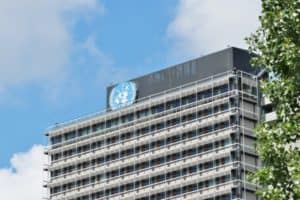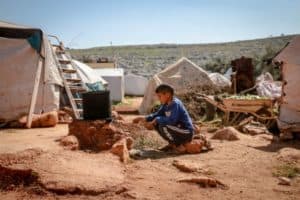This page contains affiliate links. This means if you a follow a link and make a purchase, at no additional cost to you, Humanitarian Careers will receive a commission. Thank you for supporting the site.
Paris is one of the best cities in the world to study a masters in humanitarian aid. Not only does Paris have some of the most recognised and respected universities offering masters in humanitarian work and international development, Paris also has some of the largest and most important humanitarian NGOs headquartered there.
Studying a humanitarian masters degree in Paris means gaining a core understanding of the knowledge and skills needed to work in the aid industry, whilst being able to network with leading humanitarian NGOs such as Médecins Sans Frontier, Médecins du Monde, ACTED, Solidarités International and Action Contre la Faim (ACF)
Master in Human Rights and Humanitarian Action – Sciences Po
Sciences Po is one of the most famous institutions in Paris offering masters in humanitarian aid. Their masters in Human Rights and Humanitarian Action blends the two critical fields to allow students a detailed overview of both.
The course offers a unique combination of modules focusing on human rights, whilst also offering modules on humanitarian aid. Both topics are covered with a focus on the history, theory and practical tools needed to be effective humanitarian workers. The master’s degree also incorporates philosophy, sociology and anthropology to provide further context to human rights and humanitarianism.
For those wanting to study humanitarian aid in Paris, the masters at Sciences Po is one of the leading options. The main objective of the master’s degree is to provide students with the analytical skills needed to fully understand humanitarian issues, as well as the contextual understanding required to be effective in the aid industry.
The masters in Human Rights and Humanitarian Action at Science Po in Paris also encourages students to think critically about the current issues facing humanitarianism and human rights, and how to address these challenges. Students on the master’s programme are encouraged to develop innovative new approaches to both protecting human rights and humanitarian aid.
A real advantage to studying a humanitarian masters in Paris at Sciences Po is that, alongside modules on humanitarian action and human rights, students partake in courses in key fields related to humanitarianism.
Students on the master’s degree in Human Rights and Humanitarian Action at Sciences Po in Paris take additional courses in international humanitarian law, global peace and security, global and regional humanitarian actors and current frameworks for humanitarian aid and human rights. These additional courses assist graduates from the humanitarian master at Sciences Po to have the technical and practical skills the humanitarian aid industry needs.
The masters in human rights and humanitarian action at Sciences Po in Paris is a two-year degree. The course is divided into three academic semesters, two of which are taught in Paris and one off-campus. This semester can be used to intern at a humanitarian NGO, or to do an exchange programme at another university.
Students on the humanitarian master’s degree at Sciences Po are encouraged to take advantage of the leading humanitarian organisations headquartered in Paris. Action Contre la Faim (ACF), Médecins du Monde, Médecins Sans Frontier, ACTED and Solidarités International are all based in Paris, and this allows students on the humanitarian masters at Sciences Po extensive opportunities to build their professional humanitarian networks.
Humanitarian Aid Online Courses
If you are looking to study humanitarian aid, we highly recommend the online course International Humanitarian and Development Careers. We think it provides one of the best overviews of the humanitarian sector and gives valuable insights for those searching for courses in humanitarian aid. Follow the link to the course’s page for more information.
The International Humanitarian Law Theory and Practice online course offered by Leiden University in the Netherlands provides a fantastic theoretical overview of humanitarianism. We think it’s one of the top online courses for those who want to understand the basics of international humanitarian law. Click the link to visit the course’s page for more information.
We also think the Humanitarian Action Response and Relief online course offered by Coventry University is a must for anyone looking to study humanitarian aid work. It only takes around three weeks to complete and would be a major addition to the application of anyone wanting to become an aid worker. The link is to the course’s page.
Master in International Development – Sciences Po
Sciences Po in Paris also offers a master in international development. Alongside the human rights and humanitarian masters they have, the Sciences Po masters in International Development is ideal for those wanting to study for a career in humanitarian aid in Paris.
The International Development masters at Sciences Po in Paris has a specific focus on sustainable development, in-line with the current thinking within the aid industry. The Sciences Po masters in International Development aims for students to critique conventional development models and address the major challenges in the humanitarian industry.
Studying a masters in International Development in Paris at Sciences Po provides the fundamental theories and background history of international development and the humanitarian industry. The International Development master’s degree at Sciences Po in Paris also combines academic research into development practice with real-world practical experiences, allowing for a broad critique of the aid industry.
Alongside focus on sustainable development, the International Development masters Sciences Po in Paris has a focus on global governance and how improvements to global, national and regional governance can improve development outcomes.
For those wanting to study a humanitarian masters degree in Paris, the Sciences Po masters in International Development is highly relevant. Alongside its core modules, students on the Sciences Po international development masters in Paris receive extensive training in key practical areas relevant to the humanitarian industry, such as finance, economics and policy development.
The Sciences Po International Development masters in Paris also offers students training in project management, project design and set-up and evaluation. These are important skills needed especially in the field for humanitarian work, and are another reason why studying a humanitarian masters in Paris at Sciences Po is good choice for those wanting a career in international aid.
The aim of the masters in International Development at Sciences Po in Paris is to train the next generation of development practitioners with the knowledge and skills needed to lead changes towards sustainable development.
Sciences Po advertises that the international development masters is ideal for those wanting to study development and humanitarianism in Paris and go on to work for governments and NGOs, as well as aid agencies and the UN. Sciences Po highly encourages their master’s students to network with the leading humanitarian and development agencies in Paris.
MA In International Affairs, Conflict Resolution, And Civil Society Development – The American University of Paris
The American University of Paris offers a leading master’s degree in International Affairs, Conflict Resolution, And Civil Society Development. Taking a broad scope, the two-year masters allows students to engage with a range of global topics with a multidisciplinary approach.
The bi-lingual, English and French masters allows those studying in Paris for a humanitarian masters the chance to study a range of ongoing conflicts, development issues and international events and develop new thinking to address these. The master’s degree also explores how language, culture and society affect conflicts, human development and global affairs.
Studying in a humanitarian masters in Paris at the American University allows for the development of the skills needed to go on to work in the humanitarian aid industry.
The International Affairs, Conflict Resolution, And Civil Society Development master’s degree has specific modules on highly relevant humanitarian subjects. These include an introduction to international relations, civil society and development. The masters programme at the American University of Paris also has modules on conflict management, prevention and resolution, as well as United States and world affairs – all highly relevant for a career in humanitarian aid.
Students on the International Affairs, Conflict Resolution, And Civil Society Development master’s degree at American University of Paris work collaboratively to develop a fully-rounded view of theories and practices of humanitarian affairs and global development.
The master’s degree also brings to Paris some of the leading thinkers of the development and humanitarian industries, and encourages students to build their network of Paris-based institutions and professionals. The American University of Paris master’s degree in International Affairs, Conflict Resolution, And Civil Society Development also has connections with humanitarian courses around Europe.
A real advantage to studying the International Affairs, Conflict Resolution, And Civil Society Development master’s degree at the American University of Paris is because students can elect to join culture trips and research visits arranged by the university. These include expeditions to India, Cambodia and Morocco. On these trips’ students can gain first hand field-experiences, as well as develop a full understanding of developing countries to inform their academic studies. Field visits also allow students to network with professionals and organisations from the developing world, crucial to a future career in humanitarian aid.
Masters International Affairs and Development – Dauphine University
Dauphine University in Paris offers a master’s degree in International Affairs and Development. The master’s degree is aimed at those wanting to study at post-graduate level in Paris and go on to an international career in development or humanitarian work.
The masters combines social, economic and historical subjects related to global affairs and development, as well as extensive research by the students. The post-graduate degree also includes relevant contemporary topics such as conflict resolution and the environment and aims to brief students ready for an international humanitarian career.
Studying in Paris at Dauphine University on the masters in International Affairs and Development allows for the selection of one of three specialities. These are economics, including a particular focus on development economics, sustainable development and peace studies. Each of these three specialisms allows students on the master’s degree to focus on the specific development area that they are interested in, as well as build on their previous academic experience.
Students from the Dauphine University in Paris masters in International Affairs and Development have gone on to work in humanitarian aid, governmental roles, policy development and the for the United Nations.
For those wanting to study a degree for a career in humanitarian aid in Paris, the International Affairs and Development masters at Dauphine University is a strong choice. The post-graduate course aims to increase students understanding of economic, sociological, anthropological and political organisations and networks that affect the current state of global development.
The master’s degree in International Affairs and Development at Dauphine University in Paris also includes a focus on international humanitarian law, humanitarian logistics and finance – these are key practical skills needed to work in humanitarian aid.
Another advantage to studying in Paris at Dauphine University on the International Affairs and Development post-graduate degree is that the course combines a wide range of approaches for ensure students get a comprehensive understanding of global issues. Students on the master’s degree critique current development practices, organisations, strategies and tools. They also review and engage with development and humanitarian actors from the private sector, civil society, academia and research and international organisations.
Dauphine University advertises that their international affairs and development masters is ideal for those wanting an international career and to study in Paris.
Public Policy and Development – Paris School of Economics
The Paris School of Economics is one of France’s leading colleges offering masters related to humanitarian aid. Their post-graduate degree in Public Policy and Development focuses on how local and national government policy, as well as administration and civil society, can impact development.
The two years master’s degree covers both macro- and micro-economic policy and aims for students to critique how international development has been affected by policy decisions. On the master’s degree at the Paris School of Economics in Public Policy and Development students undertake self-directed research into their chosen area of development a policy.
The masters in Public Policy and Development at the Paris School of Economics is divided over two years. In the first year of the post-graduate degree, students focus on general economics, combined with specific tools needed to affect development policy such as qualitative and quantitative methods.
Students on the first year of the Paris School of Economics master’s in Public Policy and Development work collaboratively and build key professional networks whilst being directed by leaders in the development, humanitarian and economic fields. Students are encouraged to engage with development, humanitarian, government and international organisations based in Paris throughout their studies.
On the second year of the Public Policy and Development master’s degree at the Paris School of Economics students focus on applying core development, economic and policy disciplines.
Students on the second year of the post-graduate degree also choose a specialist course on subjects such as global policies, social policies or economic history. There is also a continued focus on quantitative methods in the second year of the Public Policy and Development master’s at the Paris School of Economics. Concluding the second year of the post-graduate degree students complete their research and dissertation. This is led independently allowing those who wish to focus on policy, development and humanitarianism to do so.
For those wanting to study for a career in humanitarian aid in Paris at master’s level, consider the Public Policy and Development master’s at Paris School of Economics. The combination of development theory and practice, understanding gained on the creation, deployment and impact of public policy, combined with economics, make it a highly relevant course for aspiring humanitarians.
The Paris School of Economics advertises that graduates from their master’s in Public Policy and Development can go on to further academic research at PhD level, as well as work in humanitarian organisations such as the European Commission, United Nations, World Bank and international aid NGOs.
If you want to learn more about studying to become a humanitarian aid worker, explore our list of the top humanitarian aid online courses here.




